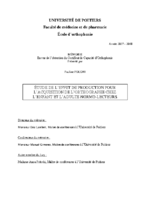Mémoire
Poloni Pauline
Étude de l'effet de production pour l'acquisition de l'orthographe chez l'enfant et l'adulte normo-lecteurs
FrançaisConsulter le texte intégral (format PDF)

Résumé
Français
Étude de l'effet de production pour l'acquisition de l'orthographe chez l'enfant et l'adulte normo-lecteurs
L’effet de production correspond au fait qu’un mot lu à voix haute est mieux mémorisé qu’un mot lu silencieusement. Les recherches montrent que chez l’adulte la lecture à voix haute permet également de mémoriser l’orthographe des mots. L’objectif de cette étude est de vérifier si l’effet de production influence la mémorisation de l’orthographe chez l’enfant normo-lecteur. Nous utilisons pour cela une phase d’apprentissage de pseudo-mots en lecture silencieuse et en lecture à voix haute, suivie d’une tâche de dictée afin d’évaluer la mémorisation orthographique. Nous avons étudié trois groupes de participants d’âge différent : CM2, 5e et adulte. Plusieurs hypothèses ont été formulées. D’abord, nous pensions que la mémorisation de l’orthographe s’améliorerait avec l’âge. Nous nous attendions également à retrouver un bénéfice de la lecture à voix haute au profit de la mémorisation de l’orthographe pour l’ensemble des participants et aussi pour chaque groupe d’âge séparément. Enfin, nous pensions retrouver une augmentation du bénéfice de la lecture à voix haute avec l’âge. Nos résultats montrent que le score global obtenu à la dictée s’améliore avec l’âge. D’autre part, les mots lus à voix haute ont été mieux retenus que les mots lus silencieusement, chez l’adulte comme chez l’enfant. Le bénéfice qu’apporte l’acte de lire à haute voix est finalement stable à tout âge. L’effet de production peut donc contribuer, chez l’enfant comme chez l’adulte, à l’apprentissage de l’orthographe de nouveaux mots.
Mots-clés libres : effet de production, orthographe, apprentissage, dictée, enfants, adultes, normo-lecteurs.
- Orthographe
- Dictées
English
Production effect is the gain in memorisation of words read aloud in comparison to words read silently. Research on the adults show that reading aloud enable the orthographic memorisation of words. The aim of this study is to verify if the production effect has an influence on the orthographic memorisation of words in the normal-reader child. We are using a pseudo-word learning phase in both reading aloud and silent, followed by a dictation task in order to evaluate the orthographic memorisation. We studied three participant groups of different ages: CM2, 5ème and adults. We formulated several hypotheses. We were expecting to find a benefit on orthographic memorisation given by reading aloud for all the participants but also in each age group taken apart. We also hypothesise that we should observe an increase of the benefit provided by reading aloud as the age increase. On the one hand, our results show that the global dictation score increase with age. On the other hand, read aloud words were memorised better than one read silently, for adults as for children. The benefit given by read aloud is finally the same at each studied age. Production effect can contribute, for children as for adults, to the orthographic learning of unknown words.
Keywords : production effect, spelling, learning, dictation, children, adults, normal readers.
Notice
- Diplôme :
- Orthophonie 5 (2017)
- Établissement de soutenance :
- Université de Poitiers
- UFR, institut ou école :
- UFR Médecine et Pharmacie
- Domaine de recherche :
- Orthophonie
- Directeur(s) du travail :
- Éric Lambert, Manuel Gimenes
- Date de soutenance :
- 26 juin 2018
- Membres du jury :
- Éric Lambert, Manuel Gimenes, Anna Potocki
Menu :
-
-
à propos d'UPétille
-
Voir aussi
Annexe :

-
Une question ?
Avec le service Ubib.fr, posez votre question par chat à un bibliothécaire dans la fenêtre ci-dessous ou par messagerie électronique 7j/7 - 24h/24h, une réponse vous sera adressée sous 48h.
Accédez au formulaire...
Université de Poitiers - 15, rue de l'Hôtel Dieu - 86034 POITIERS Cedex - France - Tél : (33) (0)5 49 45 30 00 - Fax : (33) (0)5 49 45 30 50
petille@support.univ-poitiers.fr -
Crédits et mentions légales
